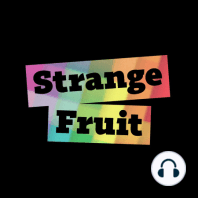26 min listen
Strange Fruit #163: The Case Against the West Louisville FoodPort
FromStrange Fruit
ratings:
Length:
30 minutes
Released:
Mar 11, 2016
Format:
Podcast episode
Description
A few weeks ago we introduced you to oSha Shireman and Charles Booker, two of the people who are working on the West Louisville Food Port. The proposed project would bring together farmers, distributors, retailers, educators and other food-related endeavors to a 24-acre campus at 30th and W. Market Streets. But not everyone is convinced that the plan is what's best for the neighborhood, and questions have been raised about whether proper procedures were followed as the proposal moved through the planning process. This week we talk to three community leaders who oppose the Food Port. Councilwoman Mary Woolridge represents Louisville Third District, where the project would be. Martina Kunnecke is the president of Neighborhood Planning & Preservation, Inc., and John Owen is a business owner in Portland. Owen says neighborhood leaders proposed a similar project in 2000, but the city didn't approve. He also worries that the Food Port food will be too expensive for its own neighbors to purchase. "If you're spending on a tight dollar in a community like Portland or Russell, you can't afford a six dollar bell pepper," he says. "They're being unrealistic." Owen also points out that Seed Capital (the company behind the Food Port) refused to sign a promise that the site won't include a biodigester in the the future (a biodigester was part of the Food Port plan at one time, but neighbors objected, and it was eventually scrapped). "They wouldn't even consider signing such a document," he says. Councilwoman Mary Woolridge believes she was intentionally misled when she asked to see the development agreement between Seed Capital and the city. Such an agreement is what ensures a developer will do what they say they'll do with a site — in this case, a site they acquired from the city for $1. When she asked to see the agreement, she was told it was still a draft, so she couldn't see it. Woolridge sees this as a case of well-connected outsiders trying to circumvent the process and disregarding resident needs. "We need to be asking West Louisville, what do you want in West Louisville?" she says. Kunnicke says that disregard for the needs and wants of the neighborhood is rooted in classism, because West Louisville residents tend to have lower incomes than some other communities. "Unfortunately we live in a society where we think that folks that have more wealth have more power, they have more knowledge, they have a greater right to shape their environments," she says. "These are cultural things that we have to address. We have to recognize them, call them out, and address them directly." We appreciate them sharing their point of view this week (although we may have learned more than we wanted to know about the shady inner workings of Metro government!). We'll keep you posted on further developments regarding the future of the Food Port and how it will affect the surrounding neighborhood. In this week's Juicy Fruit, one of our favorites, Janelle Monáe, has just been cast in a movie called "Hidden Figures," about three African-American women who worked at NASA in the 1960s, on the mission that made John Glenn the first American to orbit the Earth. The cast also includes Taraji P. Henson and Octavia Spencer, and the movie is due out in September.
Released:
Mar 11, 2016
Format:
Podcast episode
Titles in the series (100)
Strange Fruit #48: A Conversation with Trans Activist Janet Mock: Writer and activist [Janet Mock](http://janetmock.com) was living a successful life, working as a journalist, outside the spotlight, until a friend recommended her for a [profile in Marie Claire magazine](http://www.marieclaire.com/sex-love/relationship-issues/born-male). The article's publication had consequences that changed the course of her work, and life. "I didn't plan the role model part of it or the advocate part of it," she explains. "I think that all just kind of started. I realized after the piece came out that there was such a hunger to hear more about young trans women of color experiences. I think my writing just kind of went there because I think there was a need to hear more about that and I think there was also a need within myself to share more about parts of myself that I'd kept silent for so long." Janet's still a writer, but now she's also an activist - and one of the most recognizable faces in trans by Strange Fruit
